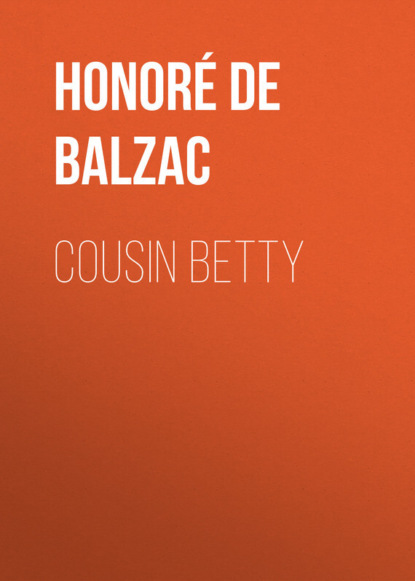По всем вопросам обращайтесь на: info@litportal.ru
(©) 2003-2024.
✖
Cousin Betty
Настройки чтения
Размер шрифта
Высота строк
Поля
Thus each household, though living as one family, had its own fortune. The Baroness, taught by bitter experience, left the management of matters to her son, and the Baron was thus reduced to his salary, in hope that the smallness of his income would prevent his relapsing into mischief. And by some singular good fortune, on which neither the mother nor the son had reckoned, Hulot seemed to have foresworn the fair sex. His subdued behaviour, ascribed to the course of nature, so completely reassured the family, that they enjoyed to the full his recovered amiability and delightful qualities. He was unfailingly attentive to his wife and children, escorted them to the play, reappeared in society, and did the honors to his son’s house with exquisite grace. In short, this reclaimed prodigal was the joy of his family.
He was a most agreeable old man, a ruin, but full of wit, having retained no more of his vice than made it an added social grace.
Of course, everybody was quite satisfied and easy. The young people and the Baroness lauded the model father to the skies, forgetting the death of the two uncles. Life cannot go on without much forgetting!
Madame Victorin, who managed this enormous household with great skill, due, no doubt, to Lisbeth’s training, had found it necessary to have a man-cook. This again necessitated a kitchen-maid. Kitchen-maids are in these days ambitious creatures, eager to detect the chef’s secrets, and to become cooks as soon as they have learnt to stir a sauce. Consequently, the kitchen-maid is liable to frequent change.
At the beginning of 1845 Celestine engaged as kitchen-maid a sturdy Normandy peasant come from Isigny – short-waisted, with strong red arms, a common face, as dull as an “occasional piece” at the play, and hardly to be persuaded out of wearing the classical linen cap peculiar to the women of Lower Normandy. This girl, as buxom as a wet-nurse, looked as if she would burst the blue cotton check in which she clothed her person. Her florid face might have been hewn out of stone, so hard were its tawny outlines.
Of course no attention was paid to the advent in the house of this girl, whose name was Agathe – an ordinary, wide-awake specimen, such as is daily imported from the provinces. Agathe had no attractions for the cook, her tongue was too rough, for she had served in a suburban inn, waiting on carters; and instead of making a conquest of her chief and winning from him the secrets of the high art of the kitchen, she was the object of his great contempt. The chef’s attentions were, in fact, devoted to Louise, the Countess Steinbock’s maid. The country girl, thinking herself ill-used, complained bitterly that she was always sent out of the way on some pretext when the chef was finishing a dish or putting the crowning touch to a sauce.
“I am out of luck,” said she, “and I shall go to another place.”
And yet she stayed though she had twice given notice to quit.
One night, Adeline, roused by some unusual noise, did not see Hector in the bed he occupied near hers; for they slept side by side in two beds, as beseemed an old couple. She lay awake an hour, but he did not return. Seized with a panic, fancying some tragic end had overtaken him – an apoplectic attack, perhaps – she went upstairs to the floor occupied by the servants, and then was attracted to the room where Agathe slept, partly by seeing a light below the door, and partly by the murmur of voices. She stood still in dismay on recognizing the voice of her husband, who, a victim to Agathe’s charms, to vanquish this strapping wench’s not disinterested resistance, went to the length of saying:
“My wife has not long to live, and if you like you may be a Baroness.”
Adeline gave a cry, dropped her candlestick, and fled.
Three days later the Baroness, who had received the last sacraments, was dying, surrounded by her weeping family.
Just before she died, she took her husband’s hand and pressed it, murmuring in his ear:
“My dear, I had nothing left to give up to you but my life. In a minute or two you will be free, and can make another Baronne Hulot.”
And, rare sight, tears oozed from her dead eyes.
This desperateness of vice had vanquished the patience of the angel, who, on the brink of eternity, gave utterance to the only reproach she had ever spoken in her life.
The Baron left Paris three days after his wife’s funeral. Eleven months after Victorin heard indirectly of his father’s marriage to Mademoiselle Agathe Piquetard, solemnized at Isigny, on the 1st February 1846.
“Parents may hinder their children’s marriage, but children cannot interfere with the insane acts of their parents in their second childhood,” said Maitre Hulot to Maitre Popinot, the second son of the Minister of Commerce, who was discussing this marriage.
ADDENDUM
The following personages appear in other stories of the Human Comedy
Beauvisage, Phileas
The Member for Arcis
Berthier (Parisian notary)
Cousin Pons
Bianchon, Horace
Father Goriot
The Atheist’s Mass
Cesar Birotteau
The Commission in Lunacy
Lost Illusions
A Distinguished Provincial at Paris
A Bachelor’s Establishment
The Secrets of a Princess
The Government Clerks
Pierrette
A Study of Woman
Scenes from a Courtesan’s Life
Honorine
The Seamy Side of History
The Magic Skin
A Second Home
A Prince of Bohemia
Letters of Two Brides
The Muse of the Department
The Imaginary Mistress
The Middle Classes
The Country Parson
In addition, M. Bianchon narrated the following:
Another Study of Woman
La Grande Breteche

















